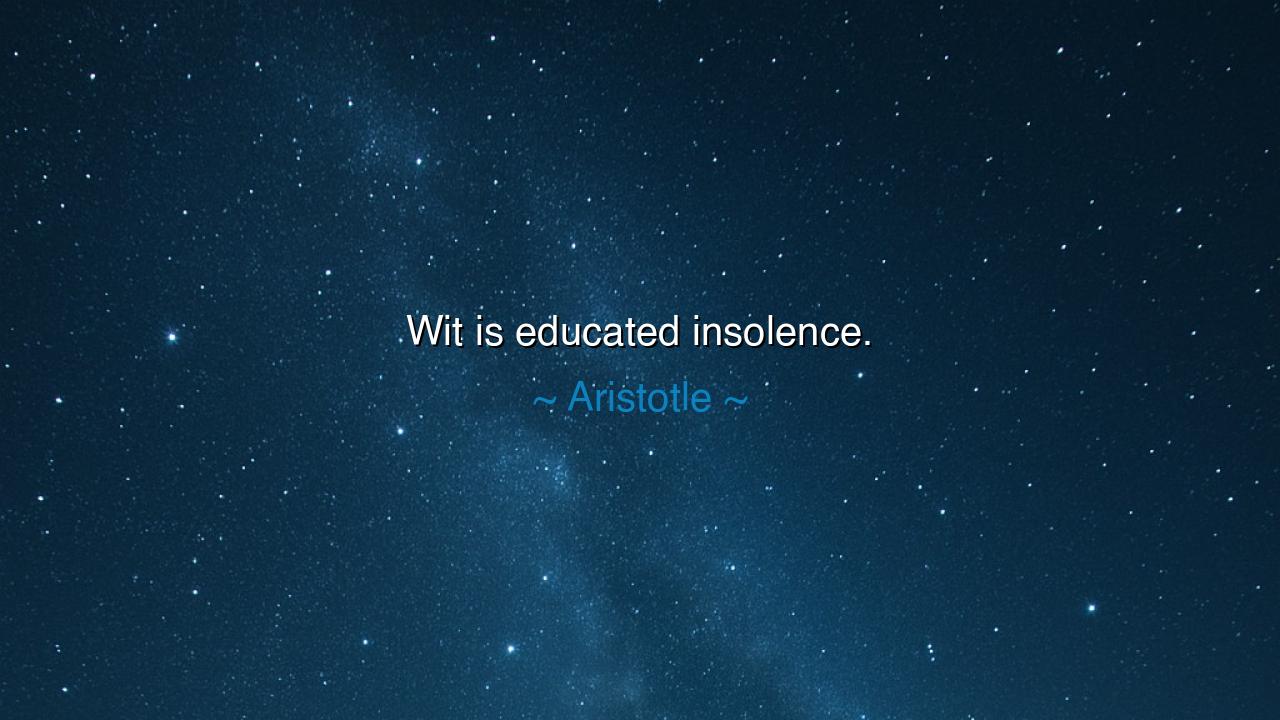
Wit is educated insolence.






In the age when philosophy was still young and truth walked barefoot among men, Aristotle, the great teacher of reason and rhetoric, uttered a saying both sharp and eternal: “Wit is educated insolence.” At first glance, these words seem playful — a jest from the master of logic — but beneath them lies the wisdom of balance, the understanding of the fine line between intellect and arrogance, humor and harm. Wit, Aristotle tells us, is a weapon forged of intellect, yet it bears the dangerous edge of insolence, that boldness which can wound if left untamed. Thus, wit is not mere cleverness, but the artful rebellion of intelligence against dullness — a rebellion that must be mastered by discipline, lest it destroy what it seeks to enlighten.
In Aristotle’s world, the Greeks revered the spoken word. To them, the ability to speak wisely and with humor was a mark of civilization. Yet the philosopher, ever the student of moderation, saw that wit carried a hidden peril. It is born of intelligence, but when untempered by virtue, it becomes mockery — the laughter that belittles rather than uplifts. When Aristotle calls wit “educated insolence,” he acknowledges its nature: it is insolence refined by culture, arrogance shaped by reason. It dares to challenge, to question, to expose hypocrisy — but it does so with grace, precision, and understanding. Wit, in its highest form, is the sword of the thinker — sharp, disciplined, and guided by justice.
The origin of this quote may be traced to Aristotle’s reflections on rhetoric and ethics, where he explored the power of speech in human interaction. He saw that humor, when guided by intelligence, could reveal truth more swiftly than argument. A jest, well-placed, could unmask folly, humble the proud, and awaken the indifferent. But he also warned that laughter could be cruel — that words, like arrows, must be aimed with care. Thus, he defined wit as educated insolence — not to condemn it, but to elevate it. He taught that the noble mind must govern its tongue as the charioteer governs his steeds: letting neither passion nor intellect run wild.
History gives us luminous examples of this wisdom in action. Consider Socrates, the philosopher who weaponized wit to humble the pretentious and awaken the slumbering minds of Athens. When accused of corrupting the youth, he did not rage or defend himself with sorrow. Instead, he answered his accusers with irony so pure and disarming that his words have echoed for millennia. His insolence was not vulgar defiance, but educated, refined, and anchored in truth. Through his wit, he exposed ignorance and revealed wisdom — not by force, but by laughter that unmasked illusion. In Socrates, wit was not cruelty but clarity, not arrogance but insight.
Contrast him with those whose insolence is uneducated — those who use mockery to destroy rather than to teach. The jester without wisdom mocks the weak; the witty philosopher mocks only falsehood. The first seeks applause; the second seeks understanding. Thus, Aristotle’s words remind us that wit without virtue becomes arrogance, and intelligence without compassion becomes cruelty. The educated mind learns not only how to strike, but when to remain silent.
To wield wit rightly, one must possess both humility and discernment. The truly wise use laughter to heal, not to humiliate. They challenge the powerful, but never scorn the powerless. They speak truths that sting, but only to awaken, not to wound. Like fire, wit can illuminate or destroy — it is the same flame that warms the hearth and burns the house. The difference lies not in the flame itself, but in the hand that tends it.
The lesson, then, is clear: cultivate the mind, but temper it with mercy. Let your words be bold, but let your heart remain kind. Learn to speak with courage, but never with cruelty. When you joke, let it be to reveal, not to ridicule. For wit, though born of insolence, must be guided by education — not merely the learning of books, but the schooling of the soul.
So, my children of wisdom and word, remember Aristotle’s teaching: “Wit is educated insolence.” Dare to speak truth with laughter, but let your laughter carry light, not poison. Be brave in thought, yet gentle in expression. For the world needs not more mockery, but more minds that can teach through joy. When intelligence learns to laugh without cruelty, and when insolence bows to wisdom, then wit becomes not a weapon of pride — but a gift of enlightenment.






AAdministratorAdministrator
Welcome, honored guests. Please leave a comment, we will respond soon